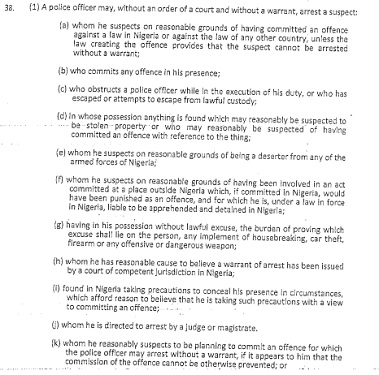President Muhammadu Buhari has signed into law the Nigeria Police Bill, 2020.
This was contained in a memo dated September 16, 2020, signed by the president who communicated his assent to the Police Bill to the National Assembly, through the Clerk of the legislature.
According to a detailed analysis by 1st News, the Act repeals the Police Act Cap. P19. Laws of the Federation, 2004, and provides for a more effective and well organised Force, driven by the principles of transparency and accountability in its operations and management of its resources.
Furthermore, this new bill institutes an appropriate funding framework for the police.
This is in consonance with what is obtainable in other federal government key institutions, enhances professionalism in the Force through increased training opportunities, and creates enduring cooperation and partnership between the police and communities in maintaining peace and combating crimes nationwide.
Nigerians criticise new Police Bill
However, Nigerians have been filled with apprehension over details of the new Bill which seemingly empowers officials to act without consequences.
It is filled with many places where it tells police officers to act where it has found “reasonable grounds”, or if there’s “reasonable apprehension”.

For instance, Section 34 of the Act says that a suspect may be handcuffed if there is “reasonable apprehension of violence or an attempt to escape”.
Section 38 also says that a police officer can arrest a suspect without a court order; and without a warrant if he suspects that the person has committed an offence on “reasonable grounds” against any law in Nigeria or another country; except the law creating the offence states that the person cannot be arrested without a warrant.
What this means is that a Nigerian police officer can arrest you without warrant; if he has “reasonable grounds” to believe you’re a suspect.
Whether or not you’re actually a suspect is irrelevant; as long as he reasonably thinks and believes that you are.
Definition of reasonable?
The question of reasonability differs from one person to another. What is reasonable to one may not be reasonable to another.
With this bill, if a police officer thinks that only criminals drive a type of car; he is backed by the law to arrest an owner of that car without warrant.
Legally, the courts have a test for reasonableness, including whether a decision is fair, just and right. But giving the Nigerian police officers these wide powers is definitely not a good thing. They will surely abuse it.
However, supporters of the law argue that this same section was in the Police Act 2004; and the Administration of Criminal Justice Act (ACJA 2015)
Many supporters of this Act have however argued that this same provision is not new; and that it was in the Police Act of 2004 and the Administration of Criminal Justice Act (ACJA).









